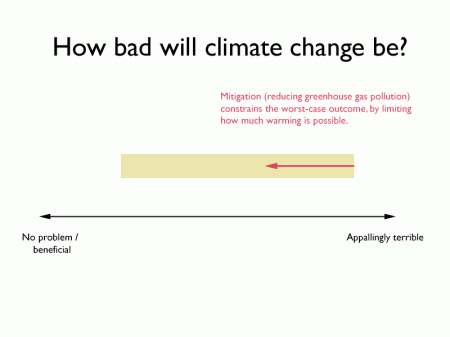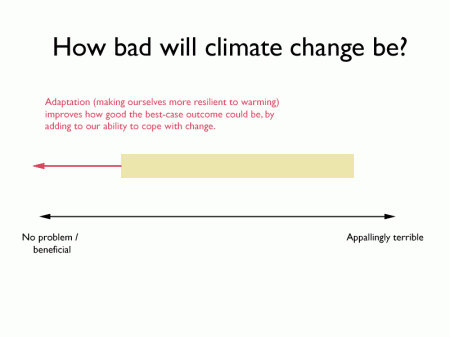The question of exactly how bad any particular degree of climate change would be is extremely challenging to answer in advance. How much net human suffering would result from warming the planet 1°C? What about 2°C? 5°C? 10°C?
The answer to this question is important, since it helps to determine what the best course of action for humanity is. In theory, we could ban the use of fossil fuels tomorrow, shut down the world’s coal-fired power stations, park cars, ground airplanes, and start re-building the energy basis of society without the use of planet-warming sources of energy. Alternatively, we could ignore the problem for years, decades, or even centuries – allowing the planet to get ever-hotter until we completely run out of fossil fuels.
Here’s one way to simplify the problem: just think about the Greenland and West Antarctic ice sheets. These massive slabs of frozen water could raise global sea levels by 14 metres if they melted completely. That would have a gigantic human impact. Major cities like New York, Vancouver, Tokyo, and London would be seriously inundated. Whole countries like the Netherlands and Bangladesh would largely cease to exist as dry land.
Bearing in mind that we are eventually going to have to abandon fossil fuels anyhow (because they exist in finite quantities), it seems sensible to say that it is worth switching away from them early to prevent the loss of these ice sheets. That is just one of the many climatic consequences that would arise from a particular level of warming. It would be accompanied by droughts, floods, agricultural changes, species relocating, ocean acidification, loss of glaciers, and much else besides. But – to simplify – we can just think about the ice sheets. That lets us set an upper bound for how much warming we can tolerate, which in turn establishes an upper bound for how many fossil fuels we can burn.
Where exactly does that boundary lie? One suggestive fact is that the ice sheets in question formed when the atmospheric concentration of carbon dioxide was about 450 parts per million (ppm). Before the Industrial Revolution, it was at around 280 ppm. Now, it is around 392 ppm and increasing by about 3 ppm per year. Based on a very crude calculation, it may be plausible to say that if we continue on our present course for twenty years or so, we will seriously endanger the integrity of the ice sheets.
The implications of that are pretty huge. Humanity needs to substantially cut greenhouse gas pollution not over the span of 50, or 500, or 1000 years, but over the next couple of decades. Furthermore, for it to be plausible that this change will occur successfully, rich developed countries like Canada need to cut first and fastest. Thus, just by considering one likely consequence of unmitigated climate change, we can make an argument that the complacent attitude of politicians who think we can concentrate on other issues is unrealistic. If we don’t handle this problem now, and we commit those ice sheets to eventual disintegration, people living during the time of inexorable sea level rise will quite rightly view our leaders and our generation as failures, when it comes to taking the most basic precautions to respect the welfare and rights of those who will come after us.




